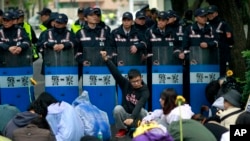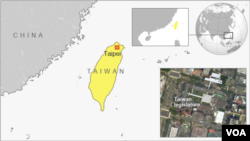TAIPEI —
Protesters are occupying Taiwan’s parliament for a second full day to block passage of a deal that would liberalize the island’s service trade with China. The aggressive protest is less about the widely supported trade pact than anger over a perceived lack of transparency.
The several hundred students who broke into Taiwan’s parliament on Tuesday night and remain inside Thursday are demanding a harder look at a pact to liberalize the service trade between their island and economic giant China. The deal that would open 144 service categories to the other side’s investors enjoys broad support, but protesters want a detailed examination before it clears parliament.
Protester Iris Chang, a Taipei resident and part of the group that broke into parliament on Tuesday, said Taiwanese people need more information.
“The government can’t just approve without the people saying yes or letting us know what exactly the law or the content is about. This is kind of like cheating on the citizens,” said Chang.
Negotiators from Taiwan and longtime political rival China approved the services trade deal in June. Taiwanese companies covered by the pact can take a controlling stake in joint ventures and expand banking, healthcare and tourism businesses in China. The agreement would help Taiwan’s larger companies but may hurt smaller ones as competitors from China open shop. Island officials believe the pact ultimately will modernize the service sector and create jobs.
Taiwan’s China policymaking body said most local business people back the deal, and a private survey in July found 59 percent support among Taiwan’s public.
Parliament has handled the deal slowly despite pressure from leaders on both sides as the two main political parties fight over how to vote on it. President Ma Ying-jeou’s Nationalist Party, which has a legislative majority, wants a quick package vote this month or next. The opposition Democratic Progressive Party advocates a more time-consuming item-by-item review that could strike clauses that might hurt local industry.
Raymond Wu, managing director of e-telligence, a political risk consultancy in Taipei, said the dispute boils down to protecting local business.
“Whether the people of Taiwan are willing and ready to open up the market and become more integrated regionally, this is the fundamental issue at stake,” said Wu.
The opposition is generally cautious toward China. Beijing has considered self-ruled Taiwan part of its territory since the Chinese civil war of the 1940s and demands eventual reunification.
Protesters gathered on Tuesday night because they say the Nationalists went back on their word after agreeing to an item-by-item review. After a break-in that night, about 400 people occupied the legislative podium with plans to stay for a hearing Friday, unless police force them out.
The several hundred students who broke into Taiwan’s parliament on Tuesday night and remain inside Thursday are demanding a harder look at a pact to liberalize the service trade between their island and economic giant China. The deal that would open 144 service categories to the other side’s investors enjoys broad support, but protesters want a detailed examination before it clears parliament.
Protester Iris Chang, a Taipei resident and part of the group that broke into parliament on Tuesday, said Taiwanese people need more information.
“The government can’t just approve without the people saying yes or letting us know what exactly the law or the content is about. This is kind of like cheating on the citizens,” said Chang.
Negotiators from Taiwan and longtime political rival China approved the services trade deal in June. Taiwanese companies covered by the pact can take a controlling stake in joint ventures and expand banking, healthcare and tourism businesses in China. The agreement would help Taiwan’s larger companies but may hurt smaller ones as competitors from China open shop. Island officials believe the pact ultimately will modernize the service sector and create jobs.
Taiwan’s China policymaking body said most local business people back the deal, and a private survey in July found 59 percent support among Taiwan’s public.
Parliament has handled the deal slowly despite pressure from leaders on both sides as the two main political parties fight over how to vote on it. President Ma Ying-jeou’s Nationalist Party, which has a legislative majority, wants a quick package vote this month or next. The opposition Democratic Progressive Party advocates a more time-consuming item-by-item review that could strike clauses that might hurt local industry.
Raymond Wu, managing director of e-telligence, a political risk consultancy in Taipei, said the dispute boils down to protecting local business.
“Whether the people of Taiwan are willing and ready to open up the market and become more integrated regionally, this is the fundamental issue at stake,” said Wu.
The opposition is generally cautious toward China. Beijing has considered self-ruled Taiwan part of its territory since the Chinese civil war of the 1940s and demands eventual reunification.
Protesters gathered on Tuesday night because they say the Nationalists went back on their word after agreeing to an item-by-item review. After a break-in that night, about 400 people occupied the legislative podium with plans to stay for a hearing Friday, unless police force them out.





